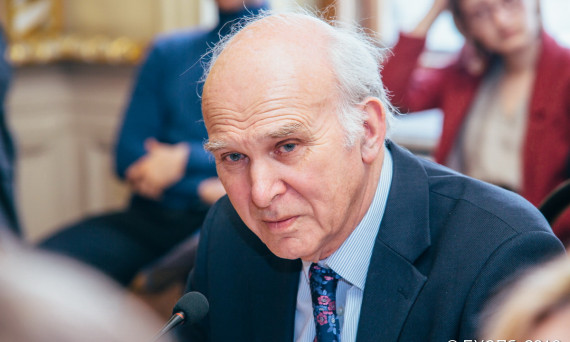On Friday, April 15, Sir Vince Cable, former Liberal Democrat MP and Business Secretary under the Coalition Government (2010-2015) delivered an honorary lecture in the Golden Hall of the European University at St. Petersburg. Sitting next to Russia’s former finance minister (2000 – 2011) and member of EUSP Board of Trustees Alexei Kudrin, Sir Cable chose the title “minister of economics” to describe better his former position in the British Government while speaking to an audience in Russia.
Interestingly, the “economics ministry” in the UK has been supervising the British university system, because that is also where knowledge and wealth are accumulated. While presenting his book Cable said most of what he wanted to say in the book came from his 5-year experience in the government. “While in the cabinet, I was not allowed to publish my book, so I did it afterwards,”- he says. “The Storm” in the title of Cable’s recent book is a metaphor to describe the year of 2008. Here at the EUSP, however, he preferred to use another metaphor saying that 2008 was the economic equivalent of a heart attack, where the doctors and surgeons (primarily Central Banks were meant here) managed to take care and help the patient keep alive through a life-support system, which was, essentially, cheap money.
He then continued with a general overview of global economic trends throughout the past years before and shortly after the “storm” of 2008. While quoting other prominent economists and experts, Cable said that we’re now living in the age of very low interest rates and they may well be the lowest since the times of Babylon. He did provide some numerical evidence to this claim by displaying a chart, according to which real long term or official short term interest rates may at time be close to zero or even below zero (e.g. in the EU or Japan). With some historical comparison of the leading economies since the early 19th century, Cable also spoke about the challenges that contemporary states and their Central Banks may be facing in the years to come. He also outlined the five “Big Risks 2016” as China’s possible hard landing, US slowdown, Brexit and EU unravelling, Brazil and the possible need of IMF bailout as well as Trump and different trade war scenarios his election might result in.
Before speaking about Russia’s case, Sir Vince Cable underlined that he is not an expert on Russia and could only share his general impressions about Russia’s challenges among which the number one in his list was the current shock of oil prices and capital outflows, which was more significant than the 2008-09 crisis. But he also mentioned that the shock has been absorbed in relative prices, not in output and jobs (e.g. Russia’s GDP fell only 4% in 2015 compared to 8% in 2009), the exchange rate has been relatively flexible (45% devaluation over 2 years) and the IMF has been praising Russia’s financial policy although calling for “structural” reform at the same time.
The presentation was then followed by a Q&A session discussing matters such as Brexit, the role and tools of governments and Central Banks in trying to face global economic challenges, changes in the nature of money itself and the effects of the “storm” and its aftermath on the societies worldwide.
Gevorg Avetikyan
About the book
In After the Storm, Vince Cable provides a unique perspective on the state of global financial markets and how the British economy has fared since 2008.
The book gives an inside view of the Coalition Government, and offers a carefully examined perspective on how the British economy should be managed during the next decade and into the future. “What was sadly missing from the 2015 election campaign,” Sir Vince argues, “was debate around the economic future of Britain, of how to make improvements in productivity to raise living standards, and above all how Britain can rebalance its economy and earn its keep in an increasingly competitive global market place.” The author addresses these issues from the unique vantage point of an academician and a business economist who has spent the last five years as a key policy maker at the heart of government.


























